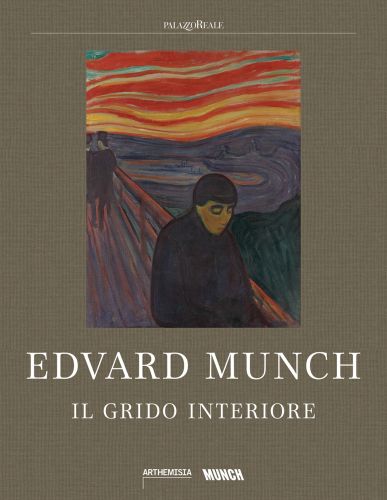Full Description
The jarring emptiness following the loss of a loved one, the expansive out-of-body sensation of sensual touch, the lassitude of melancholy and the ecstatic receptivity to sunshine. His ability to capture and convey sensation and feelings through the materials of art, places the Norwegian artist Edvard Munch (1863–1944) at the forefront of European art at the turn of the last century.
Interestingly, Munch’s artistic exploration of perception, and his persistent questioning of the objectivity of vision, intersect with ideas that matured within the fields of psychology and experimental optics at the time.
Edvard Munch: Il Grido Interiore examines these connections, demonstrating his continuing exploration of the conditions of sight. The essays in this catalogue examine this phenomenon while also probing a lesser-known aspect of the artist’s work: Munch’s relationship to Italy.
The first essay, Lasse Jacobsen’s ‘Edvard Munch. Italian Impressions’, explores this connection explicitly, as part of a general overview of Munch’s life and work.
The second text, ‘Reflections in Munch’s Inner Eye’ by Patricia G. Berman, charts the art historical context of Munch’s exploration of experience’s subjective dimension. Emil Leth Meilvang’s ‘Seeing without Sight. Munch’s Vision’, on its part, explores the relationship between Munch’s artistic development and simultaneous developments within the perceptual sciences. Edvard Munch:Il Grido Interiore includes essayistic pieces by authors Melania G. Mazzucco and Hanne Ørstavik: ‘I am a Romantic’ and ‘Who Am I’. Each demonstrates Munch’s continuing ability to light the inner fires of other artists.
Text in Italian.
About the Author
Patricia G. Berman holds the Feldberg Chair of Art at Wellesley College, Massachusetts, specializing in modern and contemporary art, the history of photography and propaganda studies. She has also taught at the University of Oslo, where she facilitated the research network Munch, Modernism and Modernity. Berman’s books and catalogues include studies of Edvard Munch, James Ensor, nineteenth-century Danish painting, gestural drawing and contemporary art. Her current book project, Solar Modernism, examines Munch’s Sun in relation to the politics and science of the body. Lasse Jacobsen is Munchmuseet’s research librarian. He has wide experience from several art libraries, including SHKS (Oslo National College of Art and Design), the National Gallery in Oslo and The Norwegian Institute in Rome. He has been involved in several projects at the museum, e.g. Edvard Munch’s texts (eMunch.no), and numerous exhibitions. Jacobsen has also contributed articles for several publications and catalogs, i.a. Munch becoming ‘Munch’: Artistic Strategies 1880–1892 (Oslo: Munchmuseet, 2008), Edvard Munch: The Modern Eye (London: Tate Publishing, 2012) and the children’s book Meet Edvard Munch (Milan: Skira, 2013). Melania G. Mazzucco is an internationally acclaimed novelist and essay writer, whose work has been translated into 27 languages. She has won multiple literary prizes, including the Premio Strega in 2003 for Vita. Many of her books explore art history, including a novel and a biography about the painter Tintoretto – La lunga attesa dell’angelo and Jacopo Tintoretto e i suoi figli (2008 and 2009) and the more recent L’architettrice, which rediscovers history’s first female architect Plautilla Bricci. Mazzucco, who also writes for theater and film, conceived and wrote the documentary Tintoretto: A Rebel in Venice in 2019. She is a regular contributor to the newspaper La Repubblica. Her next novel, Silenzio: Le sette vite di Diana Karenne, will be published in 2024. Emil Leth Meilvang is Head of Education and Collections at the Royal Danish Academy of Fine Arts in Copenhagen. He specialises in European modernist art and its intersections with scientific discourse. His PhD thesis, ‘Ecstatic Life: Biology, Surrealism, and Theories of Life in Interwar Paris and Copenhagen’ (University of Oslo, 2019), examines the surrealists’ artistic and conceptual interventions in biology. In 2022, Meilvang co-curated The Savage Eye exhibition at MUNCH, exploring connections between symbolism and surrealism. From 2024 to 2027, he will be leading a new research cluster between the Royal Danish Academy of Fine Arts and Thorvaldsen’s Museum in Copenhagen, focusing on the artist’s role as teacher in the early 19th century. Hanne Ørstavik made her debut in 1994 with the novel Hakk (Cut) and has since authored 16 novels and a collection of essays. Her contributions to literature have been recognized with several significant Norwegian awards, including the Brage Prize for fiction in 2004, the Aschehoug Prize in 2007, the Dobloug Prize in 2022 and, most recently, the Gyldendal Prize in 2024. Her books have achieved international recognition, and translations are available in more than 30 languages. Ørstavik was raised in Finnmark in northern Norway, and currently divides her time between Oslo and Milan.
